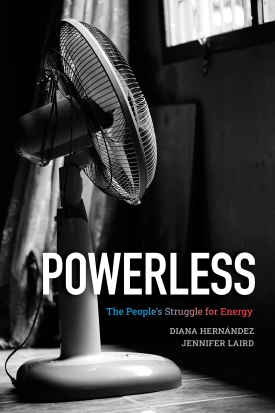
Powerless
About This Book
“In Powerless: The People’s Struggle for Energy, Diana Hernández and Jennifer Laird provide a deeply researched and urgent account of energy insecurity, a pervasive yet overlooked crisis that forces millions of Americans to choose between basic needs like heating their homes or feeding their families. Through rigorous analysis and poignant personal narratives, they highlight the far-reaching impacts of energy insecurity and offer practical, equitable solutions to provide affordable, reliable energy in a rapidly changing world.”
—JASON BORDOFF, professor of professional practice in international and public affairs, and founding director, Center on Global Energy Policy, Columbia University School of International and Public Affairs
“‘Energy security’ is not merely a problem for nation states. In Powerless, Diana Hernández and Jennifer Laird show how the high cost of core utilities makes everyday life more difficult and dangerous in poor communities across the United States. This book is an important contribution to the emerging field of energy studies and to larger debates about inequality as well.”
—ERIC KLINENBERG, professor of sociology, Helen Gould Shepard Professor in Social Science, Director of the Institute for Public Knowledge, New York University
Energy serves as the lifeblood of our daily experiences. It permeates virtually every aspect of our existence, facilitating nourishment, safety, and productivity. When affordability threatens energy’s availability, a family’s living situation can become untenable—too cold, too hot, too dark, and too often, unhealthy and unsafe. In Powerless, sociologists Diana Hernández and Jennifer Laird reveal the hidden hardship of “energy insecurity” – the inability to adequately meet household energy needs.
Approximately one in ten households in the U.S. are energy insecure and four in ten are at risk for energy insecurity. These statistics alone do not convey the acute pain of utility shutoffs, or the relentless toll of chronic energy hardships marked by difficult choices and harsh living conditions. Drawing on survey data and interviews with one hundred energy-insecure individuals and families, Hernández and Laird detail the experience of energy insecurity. Individuals and families suffering from energy insecurity endure economic hardships, such as difficulty paying utility bills, utility debt, and disconnection from utility services. They also struggle with physical challenges, such as poor housing conditions and poor or dysfunctional heating and cooling systems. They are often forced to make difficult choices about what bills to pay. These decisions are sometimes referred to as “heat or eat?” choices, as families cannot afford to pay for heating and food at the same time. Energy insecure individuals and families employ a variety of strategies to keep energy costs down to avoid having to make these hard choices. This includes deliberate underconsumption of energy, enduring physical discomfort, and using dangerous alternatives such as open flames, ovens, or space heaters to try to maintain a comfortable temperature in their home. To be energy insecure is to suffer. Despite the heavy toll of energy insecurity, most people confront these difficulties behind closed doors, believing it is a private matter. Thus, the enormous social crisis of energy insecurity goes unnoticed.
Hernández and Laird argue that household energy is a basic human right and detail policies and practices that would expand access to consistent, safe, clean, and affordable energy. Their proposals include improving the current energy safety net, which is limited and often does not serve the most energy insecure due to stringent program requirements and administrative burdens. They also suggest redesigning rates to accommodate income, promoting enrollment and expansion of discount programs, reforming utility disconnection policies, improving energy literacy, and ensuring an equitable shift to renewable energy resources.
Powerless creates a comprehensive picture of the complex social and environmental issue of energy insecurity and shows how energy equity is not just an aspiration but an achievable reality.
